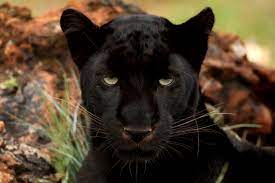
Rilke must have been feeling fine when he went into feline mode. As proof, I give you a brace of poems: “The Panther” and “Black Cat.” In them, you will see reflections of Rilke’s advice (Letters to a Young Poet) to young Kappus–not only to adopt solitude and write for yourself and yourself alone, but to look to nature, its great indifference, its acceptance of what is difficult. You know. The sort of thing poets take to instinctively. Here are two of Rilke’s better known cat works:
The Panther
His vision, from the constantly passing bars,
has grown so weary that it cannot hold
anything else. It seems to him there are
a thousand bars; and behind the bars, no world.
As he paces in cramped circles, over and over,
the movement of his powerful soft strides
is like a ritual dance around a center
in which a mighty will stands paralyzed.
Only at times, the curtain of the pupils
lifts, quietly–. An image enters in,
rushes down through the tensed, arrested muscles,
plunges into the heart and is gone.
— Rainer Maria Rilke
Black Cat
A ghost, though invisible, still is like a place
your sight can knock on, echoing; but here
within this thick black pelt, your strongest gaze
will be absorbed and utterly disappear:
just as a raving madman, when nothing else
can ease him, charges into his dark night
howling, pounds on the padded wall, and feels
the rage being taken in and pacified.
She seems to hide all looks that have ever fallen
into her, so that, like an audience,
she can look them over, menacing and sullen,
and curl to sleep with them. But all at once
as if awakened, she turns her face to yours;
and with a shock, you see yourself, tiny,
inside the golden amber of her eyeballs
suspended, like a prehistoric fly.
— Rainer Maria Rilke
The eyes have it, as they say. And notice how small we are by comparison to these animals. Shakespeare (“eyes are the windows to the soul”) would be proud. As would Twain (who referred to mankind as “the damned human race”).
As are we, fans of poetry.
